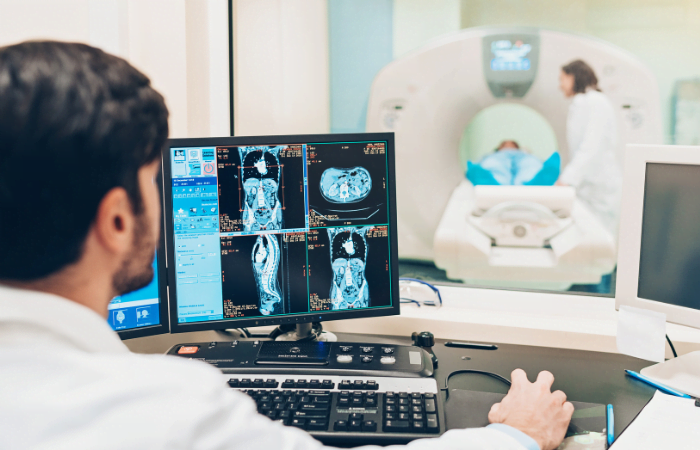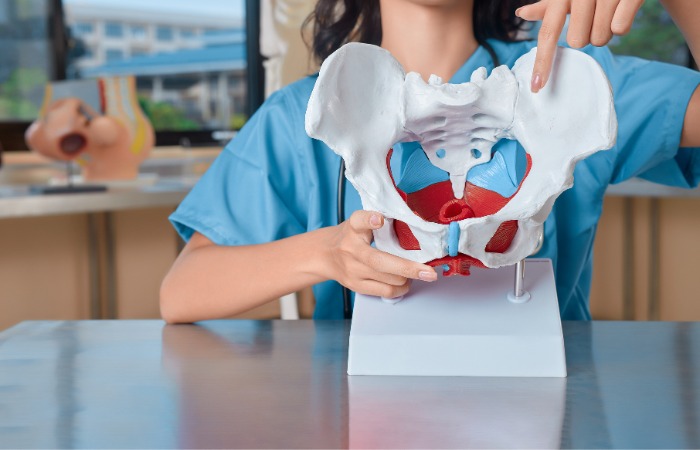
Magnetic Resonance Imaging (MRI) is a powerful diagnostic tool that allows healthcare providers to view detailed images of the internal structures of the body without the need for invasive procedures. One of the areas where an MRI scan is commonly used is the abdomen and pelvis. An MRI of the abdomen and pelvis provides high-resolution images that help doctors diagnose and monitor various conditions affecting these regions, offering valuable insights into the health of organs such as the liver, kidneys, intestines, bladder, reproductive organs, and more.
In this blog, we will discuss why you might need an MRI of the abdomen and pelvis, the conditions it can help diagnose, and the benefits of this non-invasive imaging procedure.An MRI of the abdomen and pelvis is a diagnostic imaging test that uses magnetic fields and radio waves to create detailed cross-sectional images of the organs and tissues in the abdominal and pelvic areas. Unlike X-rays and CT scans, MRIs do not use ionizing radiation, making them a safer option for many patients, particularly those who need repeated imaging.
The procedure is usually performed when a healthcare provider needs to gather more information about a particular symptom, or condition, or to monitor the progress of treatment. The MRI scan can provide clear, detailed images of soft tissues, organs, blood vessels, and other structures, making it an essential tool for evaluating the abdomen and pelvis.
There are several reasons why your doctor might recommend an MRI of the abdomen and pelvis. Here are some common conditions that can be diagnosed or monitored through this imaging technique:
1. Abdominal Pain or Discomfort
If you are experiencing persistent or unexplained abdominal pain, an MRI can help identify the underlying cause. Conditions like gastrointestinal issues, inflammatory bowel disease, or abdominal tumors can be difficult to detect with physical exams alone. An MRI can provide clear images of the organs in the abdomen, helping your doctor determine whether the pain is related to a specific issue such as a hernia, liver disease, or a mass or cyst in the abdominal organs.
2. Liver Disorders
An MRI can be particularly useful in diagnosing liver conditions such as cirrhosis, liver cancer, and fatty liver disease. It provides detailed images that help assess the liver's size, structure, and any potential abnormalities. MRI is also used to evaluate liver lesions or tumors, which may not always be visible with other imaging tests.
3. Kidney Diseases
The kidneys are vital organs responsible for filtering waste and excess fluids from the blood. MRI scans are often used to evaluate kidney function and diagnose issues such as kidney stones, cysts, tumors, or kidney infections. If you experience symptoms like blood in urine, pain in the lower back, or changes in urination, an MRI can provide detailed information on the condition of your kidneys.
4. Pelvic Pain and Reproductive Health Issues
In the pelvic region, an MRI is commonly used to diagnose conditions affecting the reproductive organs. For women, this might include uterine fibroids, endometriosis, or ovarian cysts. In men, an MRI can help detect prostate cancer or other issues related to the reproductive system. Pelvic pain, abnormal bleeding, or infertility issues may lead your doctor to recommend an MRI for further investigation.
5. Tumors and Cancers
MRI is an effective tool for detecting and monitoring the growth of tumors in both the abdominal and pelvic regions. For instance, an MRI can help detect abdominal cancers, including those affecting the liver, pancreas, colon, or kidneys. In the pelvic area, MRI is often used to diagnose gynecological cancers (such as ovarian and uterine cancers) or prostate cancer in men. MRI provides a detailed view of the tumor's size, location, and potential spread to surrounding tissues.
6. Inflammatory Bowel Disease (IBD)
Inflammatory bowel diseases, such as Crohn's disease and ulcerative colitis, can cause inflammation, ulcers, and scarring in the intestines. An MRI can help assess the extent of inflammation and monitor disease progression, particularly in patients with severe symptoms or complicated cases. MRI scans can also be used to evaluate complications such as fistulas, which are abnormal passages that can form between the intestines and other organs.
7. Abnormal Growths or Cysts
MRI is also effective in diagnosing abnormal growths or cysts in the abdominal or pelvic organs. These growths may be benign or malignant, and the MRI helps determine their size, shape, and location. This can help your doctor decide the best course of treatment, whether it involves further testing, monitoring, or surgical intervention.
8. Vascular Issues
MRI is often used to assess vascular conditions in the abdomen and pelvis, such as aneurysms or blocked blood vessels. An MRI with contrast dye can provide detailed images of blood vessels, helping detect abnormalities that may not be visible with standard X-rays or ultrasounds.

There are several benefits to choosing an MRI abdomen and pelvis:
1. Non-Invasive Procedure
MRI is a non-invasive diagnostic tool, meaning no surgery or physical incisions are required. The procedure uses magnetic fields and radio waves to create images, making it a safer alternative to invasive tests such as biopsies.
2. No Radiation Exposure
Unlike X-rays or CT scans, which use ionizing radiation, MRIs do not expose the body to harmful radiation. This makes MRI a preferable option for patients who require multiple imaging tests or those who need a scan during pregnancy (in most cases).
3. High-Resolution Images
MRI scans produce high-resolution images that provide clear details of soft tissues, muscles, and organs. This makes it an excellent choice for detecting conditions that may not be visible with other imaging techniques, especially when assessing organs like the liver, kidneys, and reproductive organs.
4. Comprehensive Diagnostics
An MRI of the abdomen and pelvis provides a comprehensive view of a large area, allowing healthcare providers to assess multiple organs at once. This can save time and prevent the need for additional tests, providing a more holistic approach to diagnosis.
If you're experiencing unexplained abdominal or pelvic symptoms, an MRI may be the key to diagnosing the underlying cause. Whether you're dealing with persistent pain, suspected organ abnormalities, or conditions like tumors, liver disease, or reproductive health issues, an MRI can provide the detailed images necessary for accurate diagnosis and treatment planning.
At Diagnopein, we offer advanced MRI technology to help you receive the most accurate diagnostic information. If your doctor has recommended an ''mri abdomen and pelvis'', then you can find us mri scans bear me or if you have concerns about your health, don’t hesitate to reach out to us for more information or to schedule your MRI scan today.